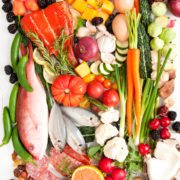Organic or Not?
One the most frequent questions I get is, does organic produce make a difference?
The short answer is yes. Choosing organic produce is not only better for our health, it’s also better for farm workers and for the environment.
Conventional produce is grown with pesticides. These chemicals kill anything that wants to destroy food while it’s growing. Pesticides improve crop yield, increasing the quantity of fruits and vegetables. Pesticides also leak into the soil and water. People who eat organic foods have lower levels of pesticides in their bodies. Growing evidence indicates that pesticides cause health problems. Different pesticides are associated with a variety of toxic effects.
- Nervous system
- Hormone system
- Carcinogenic
- Skin, eye, and lung irritation
Children are especially vulnerable. Pesticides pose a risk to vital organ systems that continue to grow and mature from conception throughout infancy and childhood. Exposure to pesticides and other toxic chemicals during critical periods of development can have lasting adverse effects both in early development and later in life. A particular issue to me is that pesticides are associated with increased risk of Parkinson’s.
[su_expanding_quote_without_link alignment=”full” source=”Stephanie Sacks, What the Fork are You Eating” full_quote=”Depending on doses, some pesticides can cause adverse effects on human health including cancer, acute and chronic injury to the nervous system, lung damage, reproductive dysfunction, and possible dysfunction to the endocrine and immune system. Low-dose, long-term exposure to endocrine-disrupting chemicals found in pesticides have adverse effects on overall human health “including links to infertility, cardiovascular disease, obesity, cancer.” short_quote=”Some pesticides can cause adverse effects on human health including cancer, injury to the nervous system, reproductive dysfunction, and possible dysfunction to the immune system.”]Pesticides are harmful to farm workers. All health risks associated with ingesting pesticides in food are compounded by inhaling and constantly being exposed externally to pesticides.
[su_expanding_quote_web alignment=”full” source_site=”Civil Eats” source_url=”https://civileats.com/2013/08/09/pesticides-taking-toll-on-farmworkers/” full_quote=”There are an estimated 5.1 billion pounds of pesticides applied to crops annually in the United States, and thousands of farmworkers each year experience pesticide poisoning. It is well-documented that a significant number of the nation’s estimated 1–2 million farmworkers and their families are exposed to toxic pesticides. These exposures result in serious short and long-term health impacts, including stinging eyes, rashes, blisters, nausea, headaches and even death. Long-term impacts include delayed and include infertility, birth defects, endocrine disruption, neurological disorders and cancer.” short_quote=”1–2 million farmworkers and their families are exposed to toxic pesticides resulting in serious short and long-term health impacts”]Pesticides are destructive to “non-target” wildlife like honeybees and butterflies. Applied through mechanical sprayers, pesticides get absorbed into the soil, run off into our water and damage the environment.
[su_expanding_quote_without_link alignment=”full” source=”Joel Fuhrman, Super Immunity, The Essential Guide for Boosting Your Body’s Defenses to Live Longer, Stronger and Disease Free” full_quote=”The Environmental Protection Agency reports that the majority of pesticides now in use are probable or possible cancer causes. Studies of farm workers who work with pesticides suggest a link between pesticide use and brain cancer, Parkinson’s disease, multiple myeloma, leukemia, lymphoma, and cancers of the stomach and prostate.” short_quote=”The Environmental Protection Agency reports that the majority of pesticides now in use are probable or possible cancer causes”]The longer answer on choosing organic is cost. Organic produce IS more expensive. But in the long-term, it’s an investment in better health and quality of life. This means less money on doctors and medicines. That said, it’s not possible to buy all organic. The key is to learn which foods have LOTS of pesticides and which aren’t so bad. I prioritize using the EWG: Dirty Dozen Guide and shop those organic or we consume less of them if they’re not organic. And I buy conventional EWG: Clean 15.
CAVEAT: It’s important to minimize exposure to pesticides, but regularly eating fruits and vegetables (even with pesticides) is more important not eating them at all. Less than one-third of adults in the US gets the recommended amount, the rates are even lower for teens. Eating plenty of vegetables and fruits is one of the healthiest choices we can make. They are loaded with nutrients beneficial to our health:
- fiber
- vitamins
- minerals
- phytochemicals (natural chemical compounds in plants)
It’s the mix of those nutrients that’s most helpful and protective. And we get that mix by eating a variety of plant foods.
I believe that as more people buy organic, increased demand will help bring down the costs of organic produce and also make organic food more available and accessible.
What To Do?
- Use the EWG: Dirty Dozen Guide and EWG: Clean 15
- Buy local as much as possible for freshness, taste and nutritional value. Even if it’s not organic, local farmers are much more in tune with the crops, and the produce will be fresher than transported for long distances. By making the choice to buy local we local farmers.
- Use Community Supported Agriculture . Basically, a farmer offers “shares” of freshly harvested vegetables, and we pick up a weekly box of seasonal produce throughout the farming season
- If using conventional produce, peel fruits/ vegetables on the “dirty” list and discard outermost leaves of lettuce and cabbage
- Always wash produce whether organic or not
Organic Foods on a Limited Budget
6 Ways to Eat Organic on a Budget
Originally published April 2017






Leave a Reply
Want to join the discussion?Feel free to contribute!